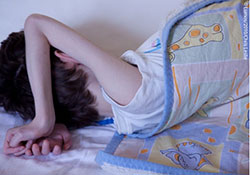Landmark declaration signed on the health of children with intellectual disabilities

Lumos/Chris Leslie
Photos may be downloaded and reproduced, provided full credit is given.
Bucharest, Copenhagen, 26 November 2010
Today, health policy-makers from the 53 countries in the WHO European Region signed a declaration expressing their commitment to improving the lives of children and young people with intellectual disabilities by improving their access to high-quality health care. The declaration was signed at the WHO European Conference: Better Health, Better Lives: Children and Young People with Intellectual Disabilities and Their Families, held in Bucharest, Romania.
Despite tremendous efforts in recent years, major challenges remain in helping intellectually disabled children lead healthy lives. Intellectual disabilities affect about 5 million children and young people in the Region, the majority living in poorer countries. More than 300 000 live in institutions, often remaining for life. Unless urgent action is taken, this number is expected to rise by about 1% per year over the next 10 years.
“Children with intellectual disabilities have the same rights to health and social care, education and protection as other young people. They should have equal opportunities to live stimulating and fulfilling lives in the community with their families, alongside their peers,” says Zsuzsanna Jakab, WHO Regional Director for Europe. “The declaration that our Member States have adopted today in Bucharest recognizes that these children have greater health needs yet they encounter major barriers in gaining access to effective health promotion and care. If they gain access to services, their needs are often either missed or neglected. The declaration maps out concrete actions that will empower these children to achieve their full potential in life.”
The declaration builds on some fundamental principles. Children with intellectual disabilities and their families need effective and comprehensive care from community-based services. Providing this entails a major shift from models based on institutional care to those that give priority to community-based living and social inclusion.
People living in poverty have a disproportionately high incidence of disability. Families with vulnerable members, including children with disabilities, are all too often trapped in chronic poverty. This is why addressing poverty and social inequities is a central part of the declaration. “Unless we address poverty among households whose members include children with intellectual disabilities, we will not meet the goals that today we have committed to reach,” stresses Zsuzsanna Jakab.
The declaration also challenges the public health community to draw a true picture of the problem and its scale. Accurate and meaningful data on disabled children are hard to find. Official statistics rarely reveal much about their situation or the problem’s extent.
”Supporting the reform of child care systems has been a priority for UNICEF in eastern Europe and central Asia for the last 20 years. We can report partial success. The reforms have delivered many new services across the region, especially alternative family-based care, and this is a significant achievement. But, sadly, what we are seeing is that children with disabilities are usually the last ones to benefit from these services. Most disturbingly, the institutionalization of children with disabilities continues as a stable trend, untouched by any reform. In many countries, children with disabilities represent as many as 60% of all children in institutions. For us, this is an indication of the failure of systems to provide tailored responses to families with disabilities and children with disabilities themselves,” underlined Steven Allen, the United Nations Children’s Fund (UNICEF) Regional Director for Central and Eastern Europe and the Commonwealth of Independent States.
National legislation and policies need further development. Few European Member States have policies that explicitly address the needs of intellectually disabled children and young people.
To fill these gaps, the declaration includes an action plan covering 10 priority areas with concrete interventions for groups of young people differentiated by their age, vulnerability and evolving capacities. The first results of carrying out this plan are expected towards the end of 2015.
The declaration is supported by the United Nations Children’s Fund (UNICEF), the European Commission, representatives ofintellectually disabled children and young people and their families, providers of social and education services, and nongovernmental organizations.
With questions, please contact:
Dr Matt Muijen
Programme Manager for Mental Health
WHO Regional Office for Europe
Scherfigsvej 8, DK-2100 Copenhagen Ø, Denmark
Tel.: +45 39 17 13 91
E-mail: mfm@euro.who.int
Ms Liuba Negru
External Relations Officer
WHO Regional Office for Europe
Scherfigsvej 8, DK-2100 Copenhagen Ø, Denmark
Tel.: +45 3917 1344, +45 2045 9274 (mobile)
E-mail: LNE@euro.who.int



